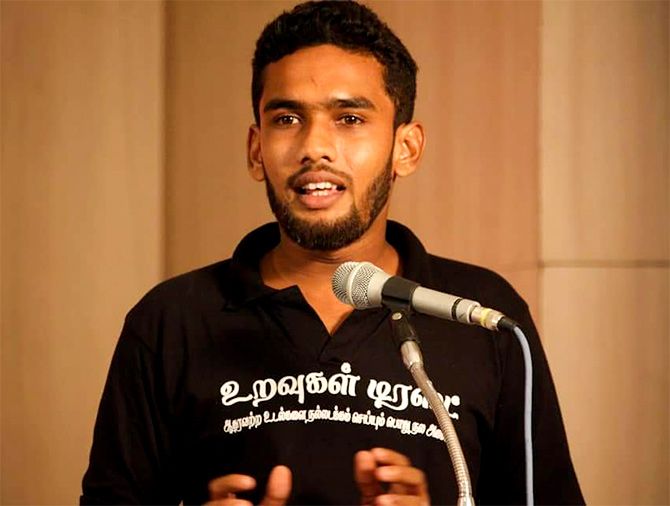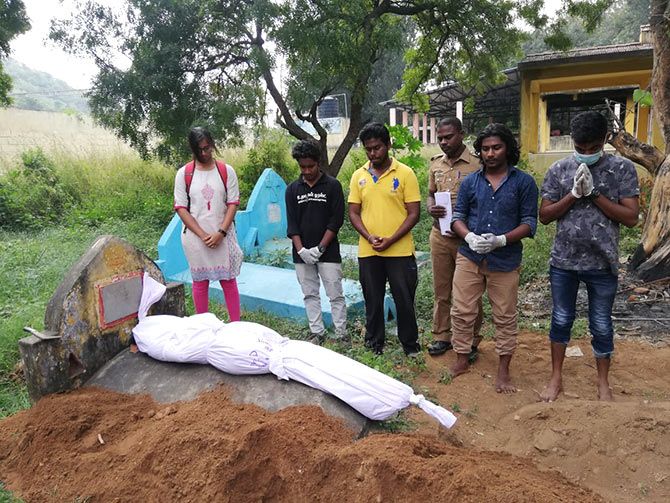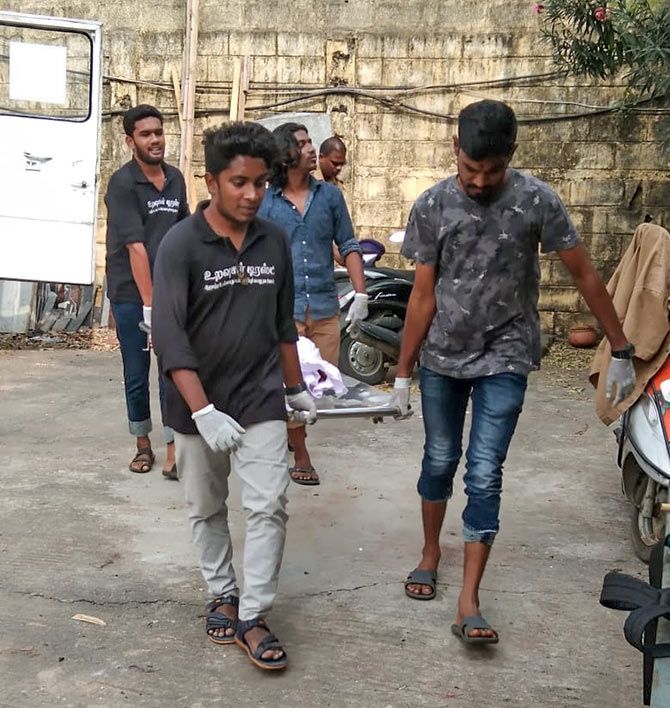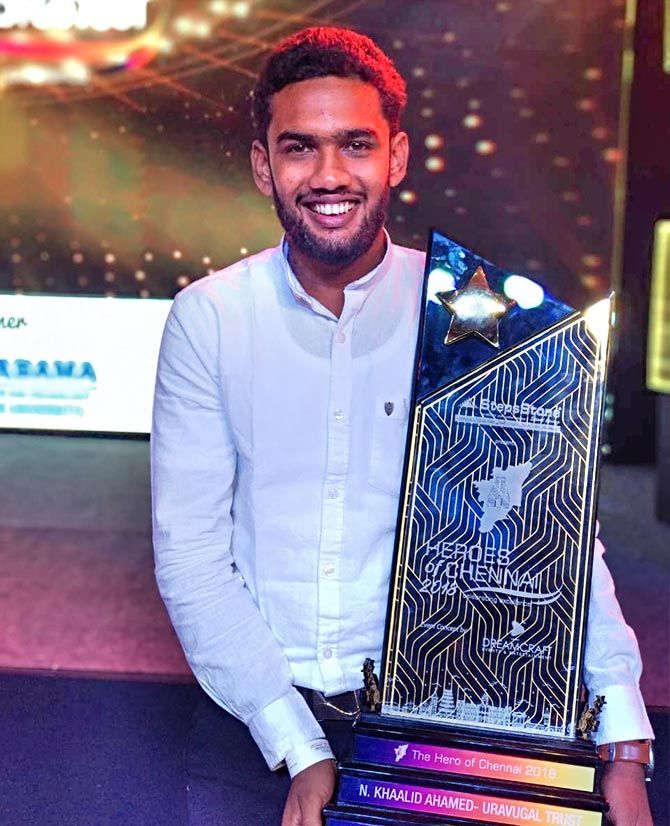 | « Back to article | Print this article |
Chennai's Khaalid Ahamed started the Uravugal Trust so he can enable the safe and dignified burial of unclaimed bodies in the city.
What started as a small initiative by seven friends is now an organisation with 400 young volunteers.
This is his story.

Two years ago, Khaalid Ahamed was walking on a busy street in Chennai with his friends when he heard an old man begging and pleading for something.
It was a hot summer afternoon and the man pleaded for some water to drink.
A few minutes after gulping the water that Khalid's friends had arranged, the man breathed his last.
"He didn't say anything. There was no one around who knew him or his name. He died just like that," Khaalid, 23 tells Rediff.com's Divya Nair about the incident that changed his life.
The next few hours the youngsters including Khaalid were running around making calls, visiting the police station and hospital.
The old man had no family or friends who cared to claim his body or bury him.
Khaalid was shaken and shocked that he saw someone die in front of him.
When he came home, he became restless.
"How would it feel if you died and no one came to your funeral? No matter how good or bad you've lived your life, no one deserves a death like the old man," he thought.
After talking to a few people, he realised that everyone had a 'final wish' -- how/where they want to be buried or who they wish to be around during their final moments.
He spoke to police personnel, hospital staff and people on the burial site and realised how everyone doesn't necessarily get a proper burial since there is an overall lack of staff, time and funds.
On July 27, 2017, Khaalid along with six of his friends registered the Uravugal Trust in Chennai. Uravugal in Tamil means relationships.
"Our only objective was to provide a dignified burial to unclaimed bodies in Chennai. We become their family and be there for them in their last journey even if it is for a few minutes," Khaalid, who is originally from Thanjavur, a district in Tamil Nadu, tells us.
The youngster distinctly remembers the first time they buried a body.
"It was of a very old man who died outside the Egmore railway station. His autopsy report said he had died of hunger. The man hadn't eaten anything for 10 days and had belted his stomach with an old cloth to avoid the pain," he recalls.
Since then, the trust, which now has 400 plus volunteers across Chennai, has buried over 150 bodies which includes just born children, outstation travellers and the destitute.
"We never promoted our NGO, we have a social media page. That's all. Most of our volunteers are women, college students or freshers aged between 18 and 28," says Khaalid.

"We work with police officers and hospitals across Chennai. They have our visiting cards with numbers. So whenever there is an unclaimed body, they inform us. We have two WhatsApp groups. One is a core group, one is for volunteers. We have a format and accordingly, we assign 5 to 6 people who are nearby and available to take it up."
When they started, Khaalid, who runs Colour Drops, a small paint business in Chennai, decided to donate Rs 200 for every funeral.
The approximate cost to bury a body is between Rs 200 to Rs 500, depending on the place of burial and transportation involved.
"When we visit a restaurant or watch a movie, we easily spend a few thousand rupees. If I could spend a little less and save some money, I could donate it for someone else who cannot manage one meal a day or doesn't have a family to take care of," he says.
The simple idea germinated into making Uravugal self sustaining, if not profitable.
The trust has also tied up with multiple NGOs, schools and colleges across Chennai where the youngsters appeal to students to value relationships, respect the old and take care of them when they become dependents.
"There are so many NGOs that do tree plantation, blood donation and provide food and scholarships to the needy. I am also part of many such NGOs. Now, we are all working together to find solutions to end poverty and provide homes to the needy and less privileged. Our aim is to make Chennai hunger-free in the next five years," he says ambitiously.
With the funds gathered, they have arranged a 24x7 ambulance which he says will help outstation travellers.
"Sometimes people travel from new cities and find themselves in a medical emergency. They can call the ambulance to take them to a nearby hospital by just paying for the diesel. If they are poor and don't have money, we are providing this service free of charge," he says.

What Khaalid and Uravugal is doing may seem a humanitarian cause, but it comes with its fair set of challenges.
There is always the risk of catching an infection or contracting a life threatening disease while transporting a body.
But these selfless warriors are looking at the bigger picture.
"If you are doing a job with all your heart, these things (the risks) don't come to your mind."

Although Uravugal is only a year old, Khaalid was nominated for The Hero of Chennai 2018 award.
According to StepsStones, , a Chennai-based real estate investment firm, Khaalid and Uravugal deserved the award for two reasons -- 'for solving an economic problem and enabling safe burial of the less privileged and also for incorporating women and enabling their entry at the burial site.'
Khaalid calls it a team effort and particularly thanks the police and good-hearted people who have supported him in the journey.
"Every day, countless people die in the city due to hunger, some disease or accidents. The police usually send photographs of the dead to all police stations for inquiries. If no one claims the body for 15 or 24 days, they are sent to the morgue. Sometimes, they lie there and are taken to medical colleges for study. Mostly, the concerned police constables or officers buy flowers and new clothes and bury these bodies from their own money. It may be part of their job, but to pay from your pocket or arrange for a funeral of someone you don't know, I feel, is a sign of humanity and selfless service."
Khaalid doesn't have specific statistics, but he says, most people die of hunger and the elderly die due to shock of abandonment and loneliness.
His appeal to readers is: "No matter what differences you have with your parents, never abandon them or drive them to a situation where they have nowhere to go or ask for help. Maybe they never told you, but your parents have sacrificed a lot so that you can enjoy what you have. Before you abuse or mistreat your mother, think about the pain she must have endured while giving you a life."
If each of us are able to share at least one meal a day with the homeless and hungry, says Khaalid, we can reduce the number of hunger-related deaths in the country.
